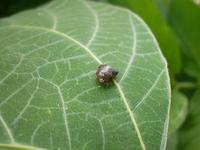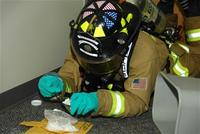-
Mississippi man arrested for sending ricin letters to Obama, Sen. Wicker
The FBI confirmed yesterday (Wednesday) that a letter addressed to President Obama was found to contain the toxin ricin. As is the case with all the mail sent to the White House, the letter was screened in a remote mail sorting facility in Anacostia, a neighborhood in southeast Washington, D.C., and intercepted. The FBI arrested a man from Tupelo, Mississippi, on suspicion that he was behind the ricin letters to the White House and to Senator Roger Wicker (R-Mississippi), who lives in Tupelo.
-
-
Experts will meet in September for the bi-annual anthrax research conference
More than 300 scientists and researchers from all over the world who work on Bacillus anthracis, the causative agent of anthrax, and B. cereus and B. thuringiensis, two closely related bacilli, will be heading to Victoria, British Columbia for the Bacillus ACT 2013 conference, which will be held 1-5 September.
-
-
Deadly wheat disease threats global food supplies
Disease-resistant wheat developed over the past half century helped ensure steady world food supplies, but a global research team warns that without increased financial support for disease resistance research, new strains of a deadly fungal disease could leave millions without affordable access to food.
-
-
Invasive kudzu bugs pose greater threat than previously thought

The invasive kudzu bug has the potential to be a major agricultural pest, causing significant damage to economically important soybean crops. Conventional wisdom has held that the insect pests will be limited to areas in the southern United States, but new research shows that they may be able to expand into other parts of the country.
-
-
New bird flu strain adapting to mammals, humans
Influenza virus depends on its ability to attach to and commandeer the living cells of its host to replicate and spread efficiently. Avian influenza rarely infects humans, but can sometimes adapt to people, posing a significant risk to human health. A genetic analysis of the avian flu virus responsible for at least nine human deaths in China portrays a virus evolving to adapt to human cells, raising concern about its potential to spark a new global flu pandemic.
-
-
Population growth a challenge to secure supplies of energy, food, water
Mention great challenges in feeding a soaring world population, and thoughts turn to providing a bare subsistence diet for poverty-stricken people in developing countries. An expert says, however, that there is a parallel and often-overlooked challenge: the global population will rise from seven billion today to almost nine billion people by 2040. Providing enough food to prevent starvation and famine certainly will be a daunting problem.
-
-
Bird flu mutation study offers vaccine clue

Scientists have described small genetic changes that enable the H5N1 bird flu virus to replicate more easily in the noses of mammals. So far there have only been isolated cases of bird flu in humans, and no widespread transmission as the H5N1 virus cannot replicate efficiently in the nose.
-
-
Footwear safety reflectors help in detecting bioterror threats

Tiny versions of the reflectors on sneakers and bicycle fenders that help ensure the safety of runners and bikers at night are moving toward another role in detecting bioterrorism threats and diagnosing everyday infectious diseases, scientists said the other day.
-
-
Arsenic contamination in food and water supplies
After virtually eliminating arsenic as a useful tool for homicide, science now faces challenges in doing the same for natural sources of this fabled old “inheritance powder” that contaminates water supplies and food, threatening more than thirty-five million people worldwide.
-
-
Concerns grow over repeated safety failures at U.S. BioLabs
According to a report that was released by the Government Accountability Office (GAO) late last month, the United States is at a high risk for accidents at laboratories which conduct research on potential bioterror germs such as anthrax because federal officials have failed to develop national standards for lab design, construction, and operation.
-
-
Farm states pass bills to protect farms from activists, whistle-blowers
In an effort to stop animal rights activists from recording acts of animal cruelty on farms, lawmakers in twelve states have proposed or enacted bills which would make it illegal secretly to record livestock farms or apply for a job at a farm without disclosing ties to animal right organizations.
-
-
L.A County to turn rain water into drinking water
Residents of Los Angeles County know that on the rare occasion that it rains, staying away from the beach is a good idea. Runoff from rain typically brings heavy metals, pesticides, cigarette butts, animal waste, and other pollutants into the streams and rivers which go into the Pacific Ocean. Now, local officials are getting together to find a solution to the water pollution and water scarcity, with an ambitious plan to make the runoff water drinkable.
-
-
Finding the right tools to respond to suspicious powder incidents

HazMat teams across the United States respond to hundreds of white powder calls each year in large cities where quick decision-making is critical. DHS makes it easier to buy the right technology for bio-threat incidents.
-
-
New device will quickly detect botulinum, ricin, other biothreat agents
Researchers are developing a medical instrument which will be able quickly to detect a suite of biothreat agents, including anthrax, ricin, botulinum, shiga, and SEB toxin. The device, once developed, approved by the Food and Drug Administration (FDA), and commercialized, would most likely be used in emergency rooms in the event of a bioterrorism incident.
-
-
China catches 12 times more fish beyond its waters than it reports
Chinese fishing boats catch about $11.5 billion worth of fish from beyond their country’s own waters each year — and most of it goes unreported. Researchers estimate Chinese foreign fishing at 4.6 million tons per year, taken from the waters of at least ninety countries — including 3.1 million tons from African waters, mainly West Africa.
-
More headlines
The long view
We Ran the C.D.C.: Kennedy Is Endangering Every American’s Health
Nine former leaders of the Centers for Disease Control and Prevention (CDC), who served as directors or acting directors under Republican and Democratic administrations, serving under presidents from Jimmy Carter to Donald Trrump, argue that HHS Secretary Roert F. Kennedy Jr. poses a clear and present danger to the health of Americans. He has placed anti-vaxxers and conspiracy theorists at top HHS positions, and he appears to be guided by a hostility to science and a belief in bizarre, unscientific approaches to public health.
